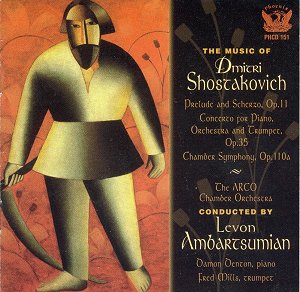 |
Dmitri SHOSTAKOVICH (1906 -
1975) |
Shostakovich's Prelude and Scherzo for Octet, scored for double string quartet, was written as a graduation assignment during 1924-25, and met with great critical acclaim at its premiere in Leningrad a year later. It is a startlingly effective work: the overtly romantic style creates moments of deep poignancy in the Prelude, and the long exploratory violin themes are full of yearning. The Scherzo is energetic and enlivening, not least through Shostakovich's mischievous use of discord. At times, this seems almost paradoxical in intention: it is sometimes so tonally excruciating that it becomes captivating.
The Concerto for Piano, Orchestra and Trumpet Op. 35 is an adorable work that fluctuates between moments of true inspiration, and openly boisterous humour. The concerto was another of Shostakovich's earlier works (1933) and this is evident in its youthful temperament. There is much internal rhythmic and harmonic conflict that is reminiscent of Stravinsky; witty interjections by the trumpet suggest jazz and military influences. Shostakovich's apparent ambiguity in genre may well be a young man's snipe at the traditional Russian concerto form, but this is no sign of immaturity; some of his slower, sparser writing is full of pain and longing - a sign of deep emotional empathy.
Having said this, the first two (early) works on the disc vacillate unpredictably between gravity and jollity; by contrast, the final work presented here is very sombre indeed. The String Quartet No.8 in C minor, Op.110 (1960), transcribed for chamber orchestra by violinist/conductor Rudolf Barshai (and subsequently renamed Chamber Symphony in accordance with Shostakovich's wishes) is a musical reaction to the horrors of the Second World War, and can even be seen as a personal outcry against such violence and destruction. The reflective themes are poignant, but these soon give way to overt depictions of war, including, in one movement, scenes of actual allied bombing. This comparatively late work was inspired by a personal visit to Dresden after the February 1945 air raids that killed 140,000 people, and Shostakovich's first-hand response to mass destruction is transparently present in the work. The young composer of two decades earlier has given way to a man of experience, and his melancholic contemplation of self-inflicted human tragedy is played out through a series of melodies and motifs which are profoundly haunting.
Violinist Levon Ambartsumian demonstrates that he is equally capable on the rostrum, and he has great understanding of the different complexities in mood that Shostakovich requires. The piano and trumpet playing of Damon Denton and Fred Mills respectively could perhaps have demonstrated a more powerful presence, but their good sense of subtlety in the more meditative passages resulted in an enjoyably imaginative interpretation. The ARCO Chamber Orchestra, Ambartsumian's own orchestra that followed him from Russia to the USA after the collapse of the Eastern Bloc, has a great affinity both with its conductor and with the music of its original homeland, and is beautifully responsive to Ambartsumian's well-proportioned sense of nuance.
Simon Hewitt Jones
See also review of Schnittke CD, Phoenix PHCD 150, conducted by Levon Ambartsumian.